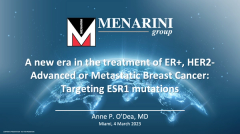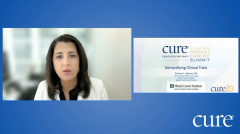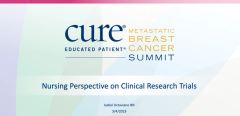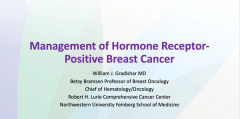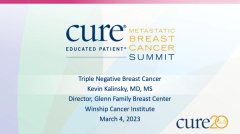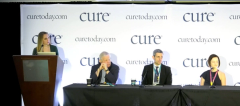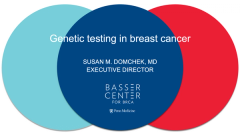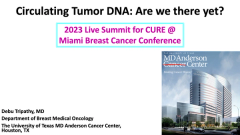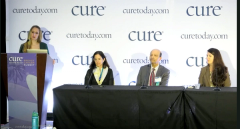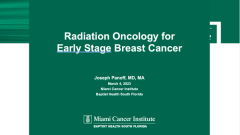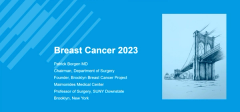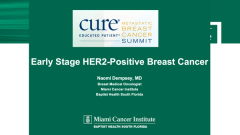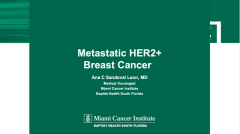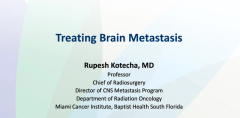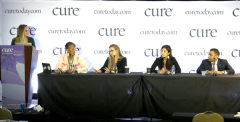
Educated Patient® Breast Cancer Summit at MBCB Hormone Receptor-Positive and TNBC Panel: March 4, 2023
Watch Dr. William J Gradishar, Dr. Kevin Kalinsky and Kelly Thomas answer questions about hormone receptor-positive and triple-negative breast cancer treatment options during the CURE Educated Patient® Breast Cancer Summit at MBCC.
Episodes in this series

This panel was moderated by Kristie L. Kahl, and included Dr. William J Gradishar, professor of breast oncology and professor of medicine at the Robert H. Lurie Comprehensive Cancer Center; Dr. Kevin Kalinsky, director of the Glenn Family Breast Cancer Center at Winship Cancer Institute at Emory University; and Kelly Thomas, a triple-negative breast cancer (TNBC) survivor and advocate.
Kahl: To start, Kelly, could you just offer some background on your journey (with triple-negative breast cancer)?
Thomas: Hi, my name is Kelly Thomas. I am a proud five-year stage 3C triple-negative breast cancer survivor. I'm also a patient advocate. I am the founder of TNBC thrivers, a community of women that share stories of living and thriving with TNBC. And I'm also a content creator on social media.
Kahl: Dr. Kalinsky, are there any studies being looked at past the five-year mark for effectiveness? So for example, if somebody's been on an aromatase inhibitor for five years, and that's all the data we have, are we looking beyond that?
Kalinsky: Right so I'm going to talk about two things. So one, because Dr. Gradishar had mentioned that for patients with early stage hormone receptor-positive breast cancer that we can see what we call late recurrences, recurrences after five years. Dr. Gradishar had also mentioned that new class of drugs that just got approved in metastatic disease, the oral SERDs. We'd had fulvestrant before but now (we have) the oral SERDs.
So there are studies that are starting to be initiated that are looking at the role of oral SERDs in that context. The other thing that is hopefully moving through the National Cancer Institute relatively soon that Dr. Gradishar had also mentioned is looking at circulating tumor DNA, which is essentially just a blood test that looks for whether there's any DNA in the bloodstream. So there's some studies that are being proposed to the National Cancer Institute about doing that.
And then you know, for those patients who've been on endocrine therapy for some time, and then potentially switching to those drugs to see if that helps prevent late recurrence. And the other thing I just want to mention, so talked about triple-negative breast cancer is as opposed to estrogen-driven breast cancer, for triple-negative breast cancers, once you hit the five-year point, it is less likely that you would have a recurrence. We really think about late recurrences in the context of ER-positive, estrogen receptor-positive breast, cancer, not so much an estrogen receptor-negative breast cancer.
Audience: I'm a patient and I'm curious what your plan or what if anything you're doing for those patients who are changing subtypes? I was initially triple-negative after mastectomy, I was ER/PR (progesterone receptor) 10%. And then HER2 positive and now recently, metastatic and I am HER2 low in the metastatic setting. So I have had treatment, I've had Herceptin (trastuzumab) and Perjeta (pertuzumab), I've had the gamut of all of the treatment. But what's being done for those of us who are changing throughout subtypes, if anything?
Gradishar: I'll just throw my two cents in. So obviously, the disease can evolve over time, it can evolve under pressure of therapy. So we don't always think of a tumor as completely homogeneous. So sometimes when you treat one target, you may actually eliminate it. And what you're left with is something that wasn't so apparent before, so that there are many variations of that explanation. So we would look at the most recent biopsy material to guide our therapy, and if you don't have hormone sensitivity, but you are her HER2 low, obviously, if trastuzumab deruxtecan were an option that would certainly, based on the data, be a very strong consideration. And you know, there may be other antibody drug conjugates that are coming along as well, that would be appropriate here. And then of course, there's a variety of chemotherapy drugs, but the basic idea is to look at the most relevant contemporary biopsy material and let that influence your treatment decisions.
Audience: What is the difference in exemestane and tamoxifen in the effectiveness and from my understanding is that it's better to continue treatment more than five years?
Gradishar: So as a general statement, the aromatase inhibitors (Ais) are modestly better in terms of reducing risks than tamoxifen. … And it really reflects most of the data from those clinical trials. So we take advantage of those differences. The question of whether longer is better. So five years was the standard duration of therapy. So in select patients, even in the absence of molecular tests, we might view those that have higher risk disease, as continuing (with). And clinical trials have looked at 10 years, even 15 years of therapy. The sweet spot based on most of the data hovers around seven to eight years of AI therapy, you can also use molecular tools. I've made reference to this in a different lecture. The breast cancer index may help some patients and their physicians guide the duration of therapy, depending on the scenario, I would probably consider extending if the patient was tolerating the therapy for a couple of more years beyond five, but it depends on the characteristics of the patient.
Kahl: Dr. Gradishar, can oral SERD treatment result in the tumor reacquiring sensitivity to anti-hormone treatment?
Gradishar: So the oral SERD we have is the one that was approved two weeks ago. And I don't know if I would say that it requires sensitivity. These are the patients who gain the most benefit in the data that was presented, or those that had been exposed to endocrine therapy for the longest duration of time. So for instance, patients who received endocrine therapy with a CDK4/6, and the duration of time they spent on that CDK4/6 inhibitor was long. The magnitude of the benefit they got from the oral SERD was significantly greater compared to those patients who say were on a CDK4/6 inhibitor for couple of months. And what that really speaks to, at least in my own mind, but I'd be interested in Dr. Kalinsky, is you're really identifying patients and tumors that are highly endocrine sensitive.
Kalinsky: Yeah, I totally agree. And I want to reiterate one thing that Dr. Gradishar had mentioned in his talk, is that the new oral SERD assessment is only approved when it's in the metastatic setting. And then also, it's only approved for patients who have ESR1 mutations. And when patients start endocrine therapy for the first time, whether it's tamoxifen or aromatase inhibitor, patients don't have an ESR1 mutation at that time, right. It's something that develops as a resistance mechanism. And we see that in about a third of times. So when we think about giving this in the metastatic setting, it is only for those patients who have ESR1 mutations.
Audience: I am in active treatment for triple-negative (breast cancer). I wanted to ask you, my diagnosis is spindle cell metaplastic. So I'm a subtype of triple-negative (breast cancer). I did well with the treatment, the chemotherapy, before and I felt like it was a 2.5-centimeter tumor that seemed to go away. But after the lumpectomy, there was 6 millimeters of residual cancer left. So I am on Xeloda (capecitabine) now. My question is metaplastic and triple-negative (breast cancer), there seems to be some differences in responses. I feel like I'm very lucky that I responded as well as I did. But can you speak a little bit more on the metaplastic side of it because there doesn't seem to be as much information. And I know it's less than 1% of all breast cancers.
Kalinsky: So metaplastic breast cancers are, as you mentioned, a rare subtype of breast cancer. Most commonly they are triple-negative breast cancers. And part of the concern has been: Are they as chemo sensitive? And there are some data in the context of metastatic triple-negative breast cancer or where there seems to be some additional benefit from immunotherapy. And so, for our patients now who are diagnosed with early stage 2 or 3 metaplastic triple-negative breast cancer, oftentimes we're giving chemotherapy and immunotherapy. And my anecdotal experience is I've had some young patients who also have been diagnosed with the subtype and seem to have some nice responses, because again, we're trying to achieve a pathologic complete response when patients go to surgery. So, I do think that that is leading to some benefit, I also think it represents the challenges with some of these rare subtypes, because they're included in the larger studies. But then to be able to do targeted studies with a rare subtype sometimes can be a bit of a challenge, but it's also coming up. This has also come up as discussion points in some of the cooperative groups to think about, “Okay, should we be doing studies that are more dedicated to specific subtypes?” When you see a patient that has the negative (proteins), we commonly classify them as triple-negative based upon the ERP on HER2 expression and metaplastic (subtypes) really are commonly triple-negative (breast cancer).
Audience: Thank you for your interesting talk and your willingness to listen to our questions. In terms of the endocrine therapy, some of the side effects is higher cholesterol, and some of the ways in which to alleviate that are statins, you find and I've read in the literature, do you find that statins then can help in the recurrence and lessening that?
Gradishar: There's epidemiologic data that suggest that maybe, and they've done a meta-analysis of trials. So whether that's an additive effect, administered half of the United States is on a statin. So, no, but I'm just wondering whether it happened. But there's some suggestion that maybe, I wouldn't go out prescribing statins as a therapeutic intervention for breast cancer
Kalinsky: I want to add two things. So one, there had been some observation on preclinical data with other drugs that we commonly give, whether it's aspirin, or Metformin. And when we did larger studies, those turned out to not be helpful in the way that we were hoping. at Emory, we actually had one of my junior colleagues has a grant to and we have an ongoing study at Emory for newly diagnosed, hormone receptor-positive to -negative breast cancer of looking at giving an aromatase inhibitor with or without a statin, to see if this decreases the proliferation of cancer cells. So that's something that my institution we are interested in looking at.
Kahl: Kelly, we're talking about a lot of different treatment options. We've heard about different types of subtypes of the diseases. So can you talk about the importance of seeking support, and maybe a little bit about the Triple-Negative Breast Cancer Foundation and your involvement and maybe resources available?
Thomas: When I was diagnosed, back in 2018, there really wasn't much of a breast cancer community online. Thus, no one really looked like me. So I decided to be the change I wanted to see. So with social media nowadays, I mean, you just go anywhere and search a hashtag, triple-negative breast cancer or young breast cancer and you'll find something. I'm honored to be the virtual chat host for the Triple-Negative Breast Cancer Foundation. We have three chats every single month. The first one is Tuesdays with TNBC friends where everyone's included. The next one is Metastatic Mondays, which is only for the metastatic triple-negative community. And the last chat of the month is Thriver Thursday, which again, is everyone. They are not recorded. They are a safe space. And sharing is always optional.
When you're going through a cancer diagnosis, such as triple-negative (breast cancer), it can be really scary. Google is not your friend. Again, I was diagnosed with stage 3C, and I can't tell you the things that I found or the things that were said to me about my diagnosis or my survival. But I'm honored to be up here with these two amazing doctors and there's a lot of hope and support in the breast cancer community and don't be afraid to reach out.
Transcription edited for clarity.
For more news on cancer updates, research and education, don’t forget to

